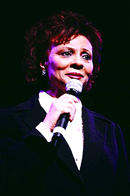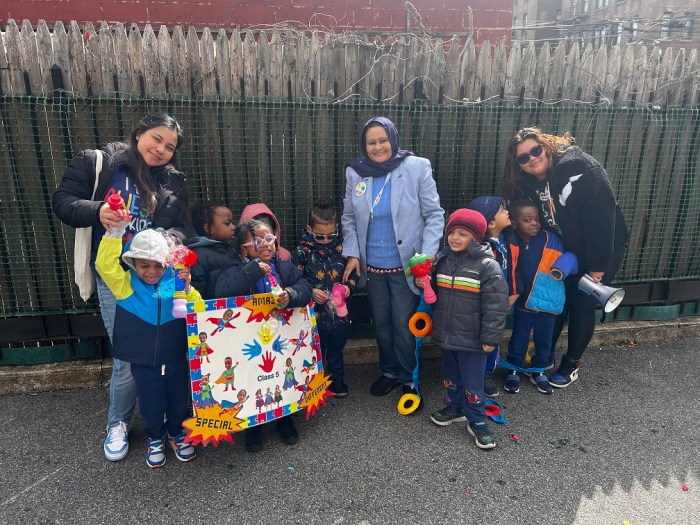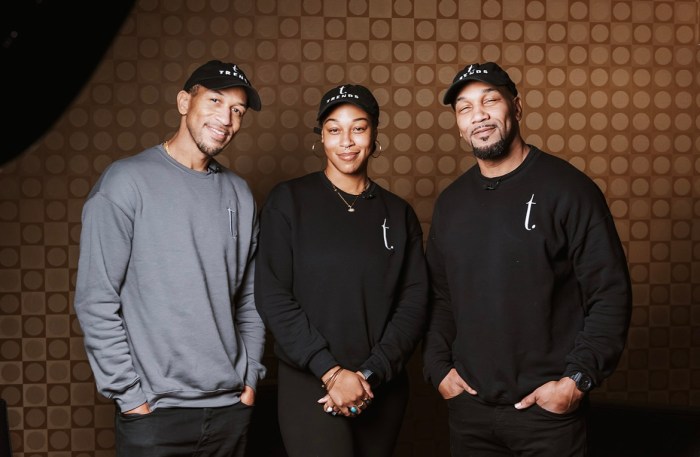Honoring Ossie Davis; Talent Showcase at Shepard Annual Memorial; Benanti’s Bowing Lesson
While the woods of Central Park were on hideous orange—not saffron—alert, due to that hubristic display of art called “The Gates,” two true, mighty redwoods of American culture recently fell—Arthur Miller and Ossie Davis. Lincoln’s birthday weekend was a total celebration of Davis, culminating in the New Federal Theatre benefit at Town Hall on February 13, in which this great man, who was originally to have hosted the event, was extolled.
Also remembered were the glory days of the New Federal—founded by Woodie King, Jr.—the ‘70s, in which plays by Ntozake Shange, Ed Bullins, Ron Milner and others were glowingly produced, starring the then little-known likes of Morgan Freeman, Phylicia Rashad, Jackee Harry, Laurence Fishburne, Samuel L. Jackson and Denzel Washington, who came in for some badmouthing for not showing up, although he was very visible at Davis’ funeral the day before.
References to historic black theater permeated the occasion, with Glynn Turman recalling the original 1959 production of “A Raisin in the Sun.” “I was just a little boy and would be wrestling backstage with my understudy,” he remembered. “Douglas Turner Ward would be playing cards with the cast, but when we’d all hear Claudia McNeil saying, ‘In my mother’s house there is still God!’ everything would stop, as we waited for the slap to follow. And then Douglas would say, ‘Whew, Claudia sure slapped the shit outta Diana [Sands] tonight!’ and resume playing. When that moment came again in the recent Puff Daddy revival, I froze all over again.”
Leslie Uggams, uncanny in her agelessness, wowed the crowd with a dulcet rendition of a generation of our fathers’ favorite song, “I’ll Be Seeing You,” and said how thrilled she was that her involvement with New Federal eventually led her to the upcoming revival of “On Golden Pond,” with James Earl Jones. (She’s replacing Diahann Carroll, who I heard couldn’t remember her lines.)
And I was glad to see Amiri Baraka hasn’t lost any of his old fire or outrage, in a lengthy diatribe in which he excoriated “Colon” Powell and “Who’s this skeeza, Condoleeza,” commenting, “I have never known minstrels to be as minstrelly as they now are in the White House.” For some reason, this prompted a white man to come up to me and say he found Baraka “racist.” Okay!?
Fayard Nicholas of the Nicholas Brothers always referred to composer Harold Arlen as the “blackest white man I ever knew.” In a centennial observance, an exhibit, “Beyond the Rainbow: Music of Harold Arlen,” is on view in the Vincent Astor Gallery at The New York Public Library for the Performing Arts. It’s a fascinating display of the career of this most soulful of American songwriters, who gave us, among countless others, “Blues in the Night,” “Stormy Weather,” “That Old Black Magic,” the greatest of torch songs, “The Man That Got Away” and, of course, “Somewhere Over the Rainbow.”
There are beautiful renderings by Lemuel Ayers of his sets for “St. Louis Woman” and “Bloomer Girl,” Truman Capote’s original scribbled lyrics for “House of Flowers” and headphones with which you can hear classic renditions of Arlen songs. Moss Hart’s original script for “A Star is Born” has a page which describes the original concept for the “Lose That Long Face” number, in which Judy Garland was to perform it in a fun house, with calliopes, slides and mirrors emphasizing only the “elongation” of her face and figure.
I was particularly gratified to see two photos of Lyda Roberti, a diva as forgotten as Garland is remembered today. The Polish Bombshell, as she was known, starred in Arlen’s 1931 “You Said It,” and if you ever want a good laugh, check out her hilarious bodaciousness sometime in “Million Dollar Legs,” a 1932 comedy that may be the funniest film ever made.
Scottish cabaret star Morag McLaren saw the exhibit with me and commented, “Arlen could really write songs for the singer, soulful and timeless, with these long phrases that are so grateful to the voice. ‘Ill Wind’ has these wonderful phrases, so mellifluous.” McLaren will be bringing her new show, “Tonight: Lola Blau,” to New York this spring. Based on a Kurt Weill-ian song cycle by Georg Kreisler, it’s a compelling period piece about a Jewish singer in Nazi-occupied Vienna, and the CD is available at Footlight Records. For more information on McLaren and her upcoming appearance, visit moragmclaren.com.

Jamie McGonnigal and Michele Helberg did a stellar job producing “Embrace!,” the second annual Matthew Shepard Foundation benefit concert on February 17. Shepard’s mother, Judy, was there, continuing her good work of providing education and safe spaces for gay and/or troubled kids. Judy Gold hosted, proving that lesbians can indeed be funny––see, Lea DeLaria? She torturied an audience latecomer—“Thanks for arriving late and not wearing something bright. Let’s play Twister on your sweater!”––and commented, “If I see one more dyke in a mullet with a fanny pack and bad shoes, I am switching and giving somebody a blow job!”
Marc Kudisch, the Alfred Drake of our time and then some, brought down the house with Liza Becker’s “I’m a Straight Man from Chelsea.” The song had him protesting way too much, although the lyrics were about working out at David Barton, getting coffee from Big Cup and toting a “not pink––salmon!” bag. “You have major cojones to sing that one,” I told Kudisch. “Is that why you’re so bow-legged?” “I really am, aren’t I?” he replied, about this “affliction,” which gives him his distinctively adorable walk. “Blame it on my Southern roots!”
Laura Benanti was joined by her mother, Linda––who retired to raise the kids after the 1980 revival of “Brigadoon”––for a touching “No One is Alone” from “Into the Woods.” Linda is Laura’s voice teacher, while dad is a psychologist, making her one actress we shouldn’t have to worry about.
“Nine” was an amazing experience for Laura, who told me, “I adored Chita Rivera. She hated the way I bowed––I used to curtsy really fast and run offstage. She told me to take three full beats––and would stand in the wings, offstage and yell, ‘One, two, three!’ I learned that it wasn’t about the bow; it was about taking respect for myself and thanking the audience. ‘You will never bow like that again,’ she told me, and I was like, ‘Yes, ma’am!’”
When she did “Into the Woods,” the only note Steven Sondheim ever gave her was “When you sing the word knew, don’t sing knoo, sing knyu, and when I did ‘A Little Night Music’ in L.A., he came backstage and was so complimentary that I literally started crying.”
Speaking of the Left Coast, the beautiful, talented Benanti would seem a sure shot for films, but she said, “Hollywood doesn’t come knocking at your door. You knock at it. It’s funny in L.A.––when I’m the ugly, fat girl in the room, that’s not normal. I would get, ‘Your hair––what color is that?’ ‘It’s called brown.’ And ‘How do you get your breasts to look like that?’ ‘Because they’re real! How about that?’”
Never mind: Benanti will make her screen debut in the B.D. Wong-directed “Social Grace,” a comedy also starring Gale Harold and Margaret Cho, and also did a show for the FX Channel. “It’s called ‘Starved,’” she explained, “a dramedy about an eating disorder group.”
gaycitynews.com




































